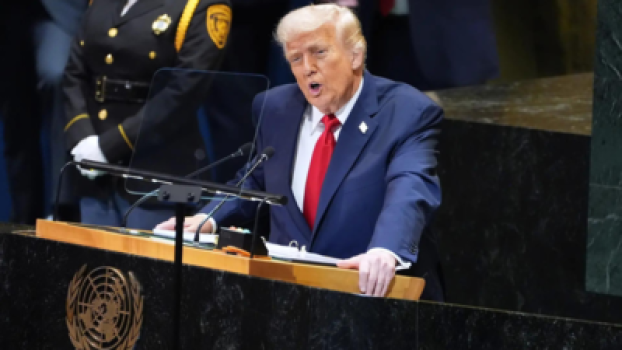At the UN, Trump condemns moves to recognize Palestinian state

In a notable speech delivered at the United Nations, President Donald Trump voiced robust opposition to any efforts aimed at recognizing a Palestinian state.
This address marked a significant moment in the complex arena of Israeli-Palestinian relations, underscoring the United States’ current foreign policy and its direction in international diplomacy. As discussions about Palestinian statehood recognition continue to evolve, understanding President Trump’s perspective and its implications for global geopolitics is vital.
Understanding the Context
Historically, the quest for Palestinian statehood has been fraught with tension and controversy. At the heart of this issue lie basic disagreements over territory, governance, and national identity. While a majority of the international community has shown varying degrees of support for Palestinian recognition, President Trump’s administration has taken a noticeably different stance.
Key Points from Trump’s Speech
During his address, President Trump highlighted several critical points:
- Unwavering Support for Israel: President Trump reaffirmed the United States’ commitment to Israel, emphasizing that recognizing a Palestinian state could undermine the security of the Israeli nation and would be a “reward” for what he termed “horrible atrocities” committed by Hamas.
- Peace Process: He argued that recognition moves could harm ongoing peace efforts, suggesting that a negotiated settlement is the only path to resolving the Israeli-Palestinian conflict. He urged a united front to pressure Hamas to release the remaining hostages.
- Condemnation of Unilateral Actions: President Trump criticized countries that are pushing for recognition, claiming these actions detract from direct negotiations and “encourage continued conflict.”
Impact of Trump’s Position on Palestinian Statehood
President Trump’s remarks at the UN reflect a broader trend in current US foreign policy regarding Israel and Palestine. The consequences of his stance include:
- Strained Diplomatic Relations: Many countries, particularly in Europe and the Arab world, see the rejection of Palestinian recognition as a significant hurdle in diplomatic negotiations. His speech comes at a time when key US allies, including the UK, France, and Canada, have recently recognized a Palestinian state.
- Increased Tensions: President Trump’s comments may aggravate existing tensions between Israel and the Palestinian territories, potentially sparking unrest and further isolating the US on the issue.
- Legacy Implications: This speech contributes to President Trump’s lasting legacy in shaping US-Israel relations, with ramifications that could affect international relations for years to come.
Benefits of Understanding Diverse Perspectives
Engaging with multiple viewpoints around the Palestinian statehood question fosters a more nuanced understanding of international relations. Here are some benefits:
- Enhanced Diplomatic Skills: Understanding various standpoints aids diplomats and negotiators in crafting solutions.
- Informed Public Discourse: A well-rounded understanding encourages public discussions on Middle Eastern policies and international advocacy.
- Conflict Resolution: Recognizing the complexities of the situation can lead to more effective strategies for peace.
Case Studies: International Reactions to Trump’s Speech
Several nations responded to President Trump’s speech, each illustrating the varied global approach to the Israeli-Palestinian conflict. Here’s a brief overview:
First-Hand Experiences: Perspectives from the Ground
Gathering first-hand accounts from individuals affected by the Israeli-Palestinian conflict provides valuable insight. Many Palestinians express concerns about the political rhetoric surrounding their statehood quest. Similarly, Israelis highlight their fears regarding security and territorial integrity. These narratives often tell a more complex story than political speeches suggest.
Conclusion
President Trump’s condemnation of moves to recognize Palestinian statehood at the UN highlights the ongoing complexities surrounding Israeli-Palestinian relations. His position is emblematic of a broader geopolitical landscape characterized by divergent perspectives and vested interests. As discussions about statehood progress, it is crucial for global policymakers to consider not only the political ramifications but also the human costs involved. Understanding this multifaceted issue lays the groundwork for constructive dialogue and diplomacy, which is essential in working toward a lasting peace in the region.